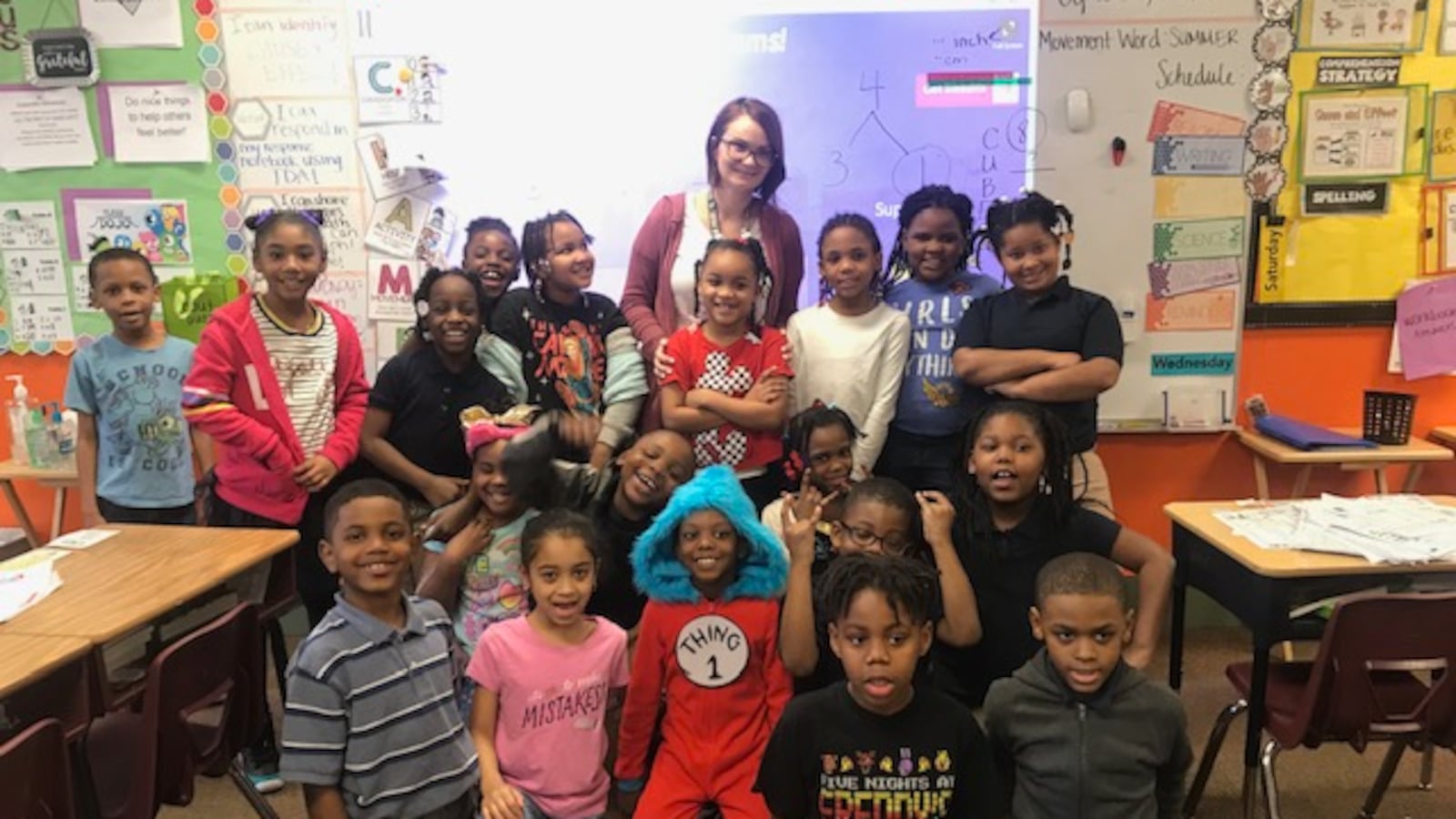Here, in a feature we call How I Teach, we ask educators who’ve been recognized for their work how they approach their jobs. You can see other pieces in the series here.
Megan Polson never wanted to be anything but a teacher.
It all started with Ms. Smolak, Polson’s first grade teacher. She told Polson that she could be whatever she wanted — perhaps a lawyer, since Polson was good in an argument. Instead, Polson went home and pretended to teach.
“I wanted to do everything she did,” Polson said. “She made great relationships with everyone in the class. It stuck with me, and there was no turning back.”
She found chances to work with kids while still in middle and high school, then went into Michigan State University’s teaching program.
After teaching in Chicago for five years, she moved back to Michigan. This is her second year as a second-grade teacher at Legacy Charter Academy, operated by National Heritage Academies.
Polson was one of 11 teachers at the network’s 89 schools who received its Excellence in Teaching Award this year.
We spoke with Polson about the “moral focus” lessons that are part of her new school’s curriculum, and about the transition from Chicago Public Schools to a charter school in Detroit.
Our conversation has been lightly edited and condensed for clarity.
What’s an issue in your school’s community that’s having an impact in the classroom?
There’s been a surge in negativity on social media and things that kids are seeing when they’re on YouTube.
That of course affects the classroom.
We take the time during our “moral focus” part of the day to talk about what those are, and how we’re handling them.
Will you tell me more about those “moral focus” lessons?
It’s new to me at this school. It’s something that NHA does. Three times a week we talk about a different virtue that we talk about as a whole school each month. This month it’s encouragement.
We start by talking about the definition of it, and then we start to apply it. We’ll spend 50 minutes three times a week talking about encouragement: how it looks at school, how it looks at home, and how it can help us be a better person. We’ll have a read-aloud once a week, then we’ll talk about if the characters are showing that virtue. And then we talk about how we can use that virtue.
It’s one of my favorite lessons to teach.
What’s an item you would be lost without in the classroom?
My PowerPoint, which is how I plan all of my lessons. It helps me stay on task with time management, it keeps me organized, and most importantly it keeps the kids engaged. They like looking at the screen and seeing whatever clip art I might put up up there.
They know when to clap and when to do the different engaging things we have going on.
What’s the best piece of advice you ever received about teaching?
To make sure that you’ve made deposits before you’ve made withdrawals. So, make sure you’re calling parents not just for negative behaviors, but tell them when their kids did great. Make sure you deposit into that relationship before you call to say something negative.
How did you get from teacher training to where you are today?
I started out student teaching in Chicago. I went to school at Michigan State. They allowed some of us to do our student teaching not in Michigan but on the South Side of Chicago. I did my student teaching there, and I loved it so much that I moved there. I spent the next five years teaching at a school just a few blocks down the street from where I student taught.
I fell in love with that community. But my family grew, we had a baby, so we decided to move back to Michigan to be nearer to my family.
Were you working in a charter in Chicago?
No I was in Chicago Public Schools.
How have you experienced the transition to a Detroit charter?
There are pros and cons to both, and I’m still working through how I feel about it. But being in a charter school for my second year here, I’ve never felt more supported. Not just in resources, but in staff. There’s a lot more people that I can go to to run ideas by.
What’s something you’ve learned about teaching from your own experience?
When I started teaching, there was a part of me that wanted to design these lessons that were perfect. Everything’s going to be cute, and cut out perfectly and color-coded, but the more you teach you realize that it’s all about the relationships.
You can make the most in-depth lessons, but if you don’t have the relationship with students, they’re not going to learn anything.


